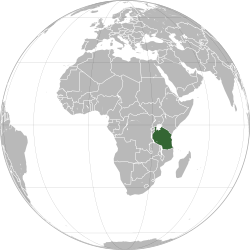 Tanzania (dark green) | |
| Country | Tanzania |
|---|---|
| Continent | Africa |
| Regulator | Tanzania Communications Regulatory Authority |
| Country code | +255 |
| International access | 000 [1] |
| Long-distance | 0 |
The following are the telephone codes in Tanzania.
 Tanzania (dark green) | |
| Country | Tanzania |
|---|---|
| Continent | Africa |
| Regulator | Tanzania Communications Regulatory Authority |
| Country code | +255 |
| International access | 000 [1] |
| Long-distance | 0 |
The following are the telephone codes in Tanzania.
The NSN length is nine digits.
Calls to Kenya and Uganda require a regional prefix rather than having to use full international dialling. To call Kenya from Tanzania, subscribers dial 005 instead of +254, while to call Uganda, they dial 006 rather instead of +256. To call Tanzania from Kenya and Uganda, subscribers dial 007 instead of +255.
Until 1999, Tanzania, Kenya and Uganda shared a telephone numbering plan, in which subscribers were only required to dial the trunk code, area code and number. In that year, Tanzania adopted a new numbering plan.
| LIST OF ALLOCATIONS [2] [3] | |
|---|---|
| Area Code | Region |
| 20 | [spare area code] |
| 21 | [spare area code] |
| 22 | Dar es Salaam Region |
| 23 | Lindi, Morogoro, Mtwara, & Pwani Regions |
| 24 | Zanzibar (Mjini Magharibi, Pemba North, Pemba South, Unguja North, & Unguja South Regions) |
| 25 | Katavi, Mbeya, Rukwa, Ruvuma, & Songwe Regions |
| 26 | Dodoma, Iringa, Njombe, Singida, & Tabora Regions |
| 27 | Arusha, Kilimanjaro, Manyara, & Tanga Regions |
| 28 | Geita, Kagera, Kigoma, Mara, Mwanza, Shinyanga, & Simiyu Regions |
| 29 | [spare area code] |
VoIP services begin with 41:
| LIST OF ALLOCATIONS [4] | |
|---|---|
| Prefix | Usage and operator |
| 41 11 | Africa Online |
| 41 12 | SimbaNET |
| 41 14 | Six Telecoms |
| 41 15 | Startel / Raha |
Non-geographic numbers for corporate networks start with 5. [3]
See also Telecommunications in Tanzania#Telephones
Mobile numbers start with 6 or 7:
| LIST OF ALLOCATIONS [2] [3] Non-geographic number for mobile telephony services – (Find Me Anywhere) | |||
|---|---|---|---|
| Prefix | Operator | Trading as | Operational [1] |
| 61 | Viettel Tanzania Limited | halotel | yes |
| 62 | Viettel Tanzania Limited | halotel | no |
| 63 | Mkulima African Telecommunication Company Limited | Amotel | no |
| 64 | Wiafrica Tanzania Limited | CooTel | no |
| 65 | MIC Tanzania Limited | tiGo | yes |
| 66 | Smile Communications Tanzania Limited | smile | yes |
| 67 | MIC Tanzania Limited | tiGo | yes |
| 68 | Airtel Tanzania Limited | airtel | yes |
| 69 | Airtel Tanzania Limited | airtel | yes |
| 71 | MIC Tanzania Limited | tiGo | yes |
| 72 | MO Mobile Holding Limited | no | |
| 73 | Tanzania Telecommunications Company Ltd | TTCL | yes |
| 74 | Vodacom Tanzania Limited | Vodacom | yes |
| 75 | Vodacom Tanzania Limited | Vodacom | yes |
| 76 | Vodacom Tanzania Limited | Vodacom | yes |
| 77 | MIC Tanzania Limited | tiGo | yes |
| 78 | Airtel Tanzania Limited | airtel | yes |
| 79 | Vodacom Tanzania Limited | Vodacom | yes |
Non-geographic numbering begins 8 or 9:
| LIST OF ALLOCATIONS [2] | |
|---|---|
| Prefix | Usage |
| 800 | Allocated for national toll-free services |
| 808 | Allocated for international toll-free services |
| 840 | Allocated for national shared-cost services on fixed network |
| 860 | Allocated for national toll-rate services on fixed network |
| 861 | Allocated for national special rates on fixed network |
| 90X | Allocated for national premium services |
| LIST OF ALLOCATIONS [3] | |
|---|---|
| Prefix | Usage |
| 110 | Emergency services for Lake Victoria and other water bodies |
| 111 | Crime Stoppers |
| 112 | Police Emergency |
| 113 | Anti-corruption |
| 114 | Fire services |
| 115 | Ambulance Services |
| 116 | Child Help Line |
| 117 | Health Help Line |
| 118 | Safety in National Parks and Game Reserves |
| 119 | Anti-Drugs |
| 190 | Disaster Services |
| 199 | Afya Call center (Health emergency, education, and information services) |